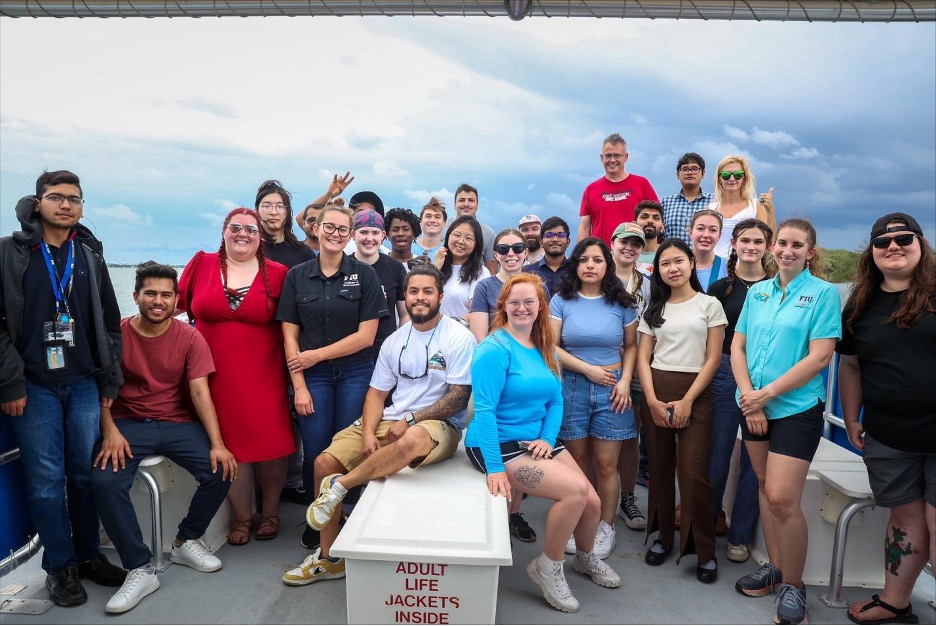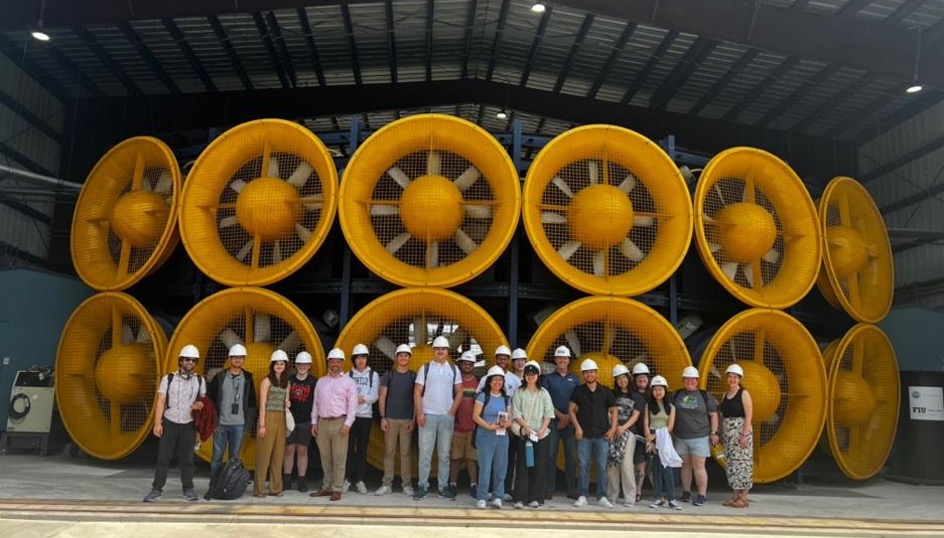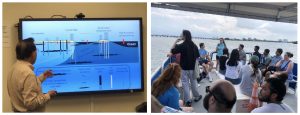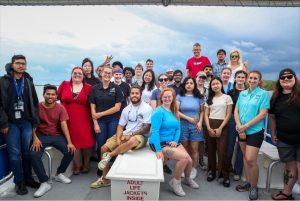In a packed and productive May, the ACCESS Operations team conducted its second cohort of the Student Training and Engagement Program (STEP-1) at Florida International University from May 13-24. Fifteen students participated in this intensive training program, aimed at exploring careers in cyberinfrastructure.
The 2024 STEP Curriculum
The students received comprehensive training in Computational Infrastructure and Tools, encompassing a range of essential topics. They delved into AI and machine learning (ML), examining ML applications and key resource providers. The curriculum also included practical insights into cluster computing, high-performance computing (HPC), and high-throughput computing (HTC), alongside an overview of computational infrastructures (CI).
Additional training covered cloud computing, providing foundational knowledge, an introduction to OpenStack, and practical exercises such as launching and connecting to virtual machines (VMs) using Exosphere, working with containers, and understanding various resource providers. The training concluded with a practical application involving a regression exercise on the Boston Housing Data Set using Google Colab.
The Cybersecurity session provided students with a comprehensive introduction to careers in cybersecurity, highlighting diverse opportunities within this critical field. Participants learned about secure configuration of Linux environments, gaining essential skills for protecting systems from unauthorized access and vulnerabilities. The session also covered practical techniques in sniffing and password cracking, equipping attendees with knowledge to identify and mitigate security threats effectively. These focused topics aimed to build a strong foundation in cybersecurity principles and practices.
The Advanced Networking & Data Transfer session delved into the fundamentals of Research and Education Networks (RENs), including academic networks and ACCESS networking assets. It covered the basics of TCP dynamics and the design of Science DMZ, a specialized network architecture aimed at optimizing data transfers for scientific research. The session also focused on network monitoring through perfSONAR, a tool for measuring and monitoring network performance. Participants engaged in hands-on activities with perfSONAR and explored various hardware and software solutions for efficient data movement, enhancing their practical understanding of advanced networking and data transfer techniques.
The participants also heard from a variety of cyberinfrastructure resource providers and ACCESS-CI partners. These included the Partnership for the Advancement of Throughput computing (PATh), Pittsburgh SuperComputing and the Bridges-2 HPC cluster, Indiana University’s Jetstream2 cloud computing ecosystem, and the State University of New York Stonybrook’s Ookami cluster. Participants also received CI career path stories and advice from the ACCESS-CI Operations leadership team at the University of Illinois, Indiana University, and Pittsburgh Supercomputing Center.
Exploration of the FIU Research Community
Along with the extensive introduction and hands-on-activities addressing CI in a classroom setting, the participants were introduced to the research feuling the need for advanced computing resources.
Smart Grid Test-Bed Laboratory
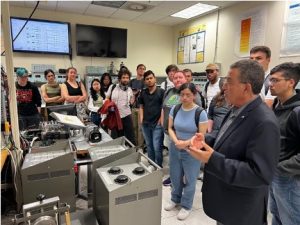 Students learned about emulating real-time AC power grids, including scenarios with actual power generation, transmission, and distribution. This lab focuses on implementing a micro-scaled smart grid by addressing communication and control issues. The Smart Grid concept is divided into three main sections: smart generation, smart control, and smart consumption, each relying on a robust communication infrastructure connecting all components to a centralized point. The lab’s work is crucial for developing and testing components and systems necessary for efficient, responsive, and integrated power grids in the future.
Students learned about emulating real-time AC power grids, including scenarios with actual power generation, transmission, and distribution. This lab focuses on implementing a micro-scaled smart grid by addressing communication and control issues. The Smart Grid concept is divided into three main sections: smart generation, smart control, and smart consumption, each relying on a robust communication infrastructure connecting all components to a centralized point. The lab’s work is crucial for developing and testing components and systems necessary for efficient, responsive, and integrated power grids in the future.
NSF NHERI Wall of Wind Experimental Facility (WOW EF) at FIU
Visiting the WOW allowed students to see full-scale testing of entire structures, leading to performance-based hurricane design by correlating wind speed with performance and damage levels. Developed by the International Hurricane Research Center (IHRC) and the College of Engineering and Computing (CEC) at FIU, the Wall of Wind (WOW) is as transformative for wind engineering as crash testing was for automotive safety. The WOW can test full-sized structures to failure, offering insights into hurricane risks, damage mitigation, and infrastructure sustainability. Funded by a grant from the National Science Foundation (NSF), and the State of Florida, the WOW projects focus on developing risk-based and performance-based design criteria to enhance the resilience of coastal communities against hurricanes.
MI1 Equinix Data Center
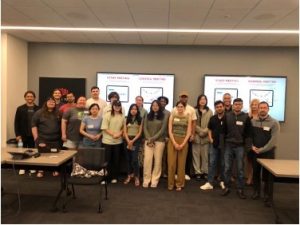 The students also toured the MI1 Equinix Data Center in Downtown Miami, a primary network exchange point between the US and Latin America. Equinix, the world’s leading digital infrastructure company, connects industry-leading organizations across various sectors, including finance, manufacturing, retail, transportation, government, healthcare, and education. Established as a vendor-neutral multitenant data center provider, Equinix promotes equality, neutrality, and internet exchange, currently operating over 260 data centers worldwide. Business leaders rely on Equinix’s trusted global platform to sustainably and securely interconnect the foundational infrastructure that powers their success.
The students also toured the MI1 Equinix Data Center in Downtown Miami, a primary network exchange point between the US and Latin America. Equinix, the world’s leading digital infrastructure company, connects industry-leading organizations across various sectors, including finance, manufacturing, retail, transportation, government, healthcare, and education. Established as a vendor-neutral multitenant data center provider, Equinix promotes equality, neutrality, and internet exchange, currently operating over 260 data centers worldwide. Business leaders rely on Equinix’s trusted global platform to sustainably and securely interconnect the foundational infrastructure that powers their success.
FIU Institute of Environment
During their visit to the FIU Institute of Environment, students learned about significant future threats posed by environmental change including sea-level rise, salt water intrusion, extreme heat and increasing disturbances. They explored how the institute provides sustainable, data-driven solutions to society’s most pressing challenges. Additionally, the students enjoyed a boat trip to the CREST research buoys, which monitor the health of waterways and alert scientists when water conditions reach critical levels, enabling swift responses to prevent disasters.
The FIU Institute of Environment promotes broad, cross-disciplinary research in environmental sciences (environment.fiu.edu), focusing on freshwater, wetlands, coastal, and marine sciences. The institute is divided into three major divisions: the Freshwater Resources Division, the Coastlines and Oceans Division (including the Sea Level Solutions Center), and the Land and Biodiversity Division (featuring the International Center for Tropical Botany at The Kampong and the Agroecology Program). These divisions support research and biodiversity projects across various ecosystems.
The Frost Museum
During their visit to the Patricia & Phillip Frost Art Museum, the STEP-1 students experienced the museum’s mission to provide transformative experiences through art by collecting, exhibiting, and interpreting art across diverse cultures. The museum’s exhibition schedule reflects the rich diversity of Miami’s population, featuring artists from around the world and encompassing various cultures, disciplines, and genres. As a free institution, the Frost Art Museum offers the Miami community exceptional access to arts education. It showcases both emerging and established local artists in various exhibitions throughout the year, enriching the cultural fabric of the community.
FIU School of Architecture Miami Beach Urban Studios (SOA MBUS)
The STEP-1 students’ cohort visited the SOA MBUS on the famed Lincoln Road South Beach, a unique 7,500-square-foot facility. This interdisciplinary hub hosts thought-provoking exhibitions, classes, research laboratories, and events for the FIU School of Architecture’s departments, including Architecture, Landscape Architecture, and Interior Architecture. The students explored the 3,500-square-foot Knight-sponsored SOA Innovation Lab, which boasts over 62 3D printers, making it one of the largest 3D printing laboratories of its kind in Florida. The lab’s selection for the HP/EDUCAUSE Building the Campus of the Future Project highlights its cutting-edge capabilities. The visit underscored the studio’s commitment to high-quality teaching, state-of-the-art research, creative activities, and engagement and partnerships with both local and global communities, aligning with its mission to support exceptional experiential learning, innovative research, and collaborative entrepreneurship.
“It was our pleasure hosting the ACCESS STEP cohort and showcasing the innovative research and technology that MBUS is so passionate about. We believe that such experiences are invaluable in motivating and educating the future generation of scientists and engineers, and we are thrilled to have been a part of that process!” said Jacqui Thompson, Program Manager at the SoA Miami Beach Urban Studios.
The Wolfsonian Museum
The STEP-1 students also visited the Wolfsonian Museum at Florida International University, which houses a vast collection of over 200,000 objects dating from 1850 to 1950. The museum’s artifacts trace significant historical transformations, from agrarian to urban societies and colonial empires to Cold War superpowers. Key highlights include household appliances, cultural designs, ambitious architectural plans, and wartime propaganda, with materials sourced primarily from Europe and the United States, extending to Latin America, Asia, and Africa. Originally started from a single hotel room key, the collection has grown into a cornerstone of Miami’s cultural landscape and a significant asset to FIU since 1997. During their visit, students learned about The Wolfsonian’s multi-year digital strategy, which enhances the integration of technology in museum operations. This strategy builds on previous successes in workflow, digital literacy, and data collection, and focuses on digital content creation and broadening access to the collection. The Wolfsonian team showcased applications of searchability tools and human-centered design principles that ensure the institution remains innovative and accessible in the future.
Five of those students will continue with full-time internships as part of the STEP-2 program, running from June 10 to August 2. If you’ll be attending PEARC24 this year, be on the lookout for these students at the conference! The program is still seeking mentors.
Are you passionate about empowering the next generation of students? Do you have expertise in your field and a desire to guide and inspire? The ACCESS Student Training and Engagement Program (STEP) is seeking dedicated mentors like you.
